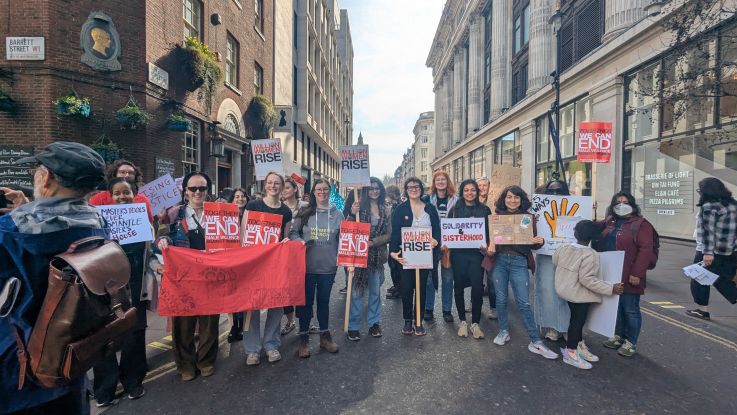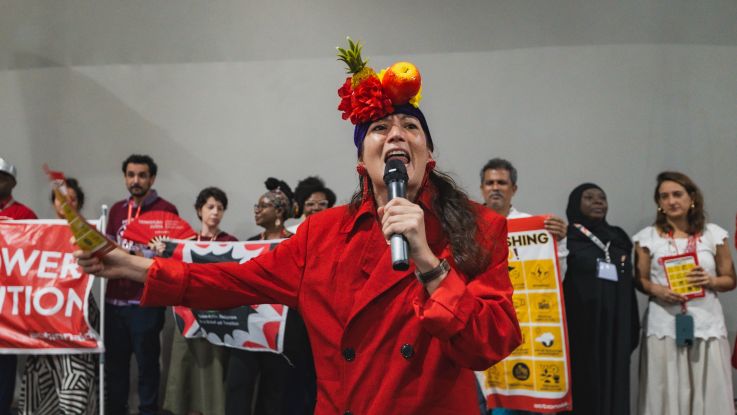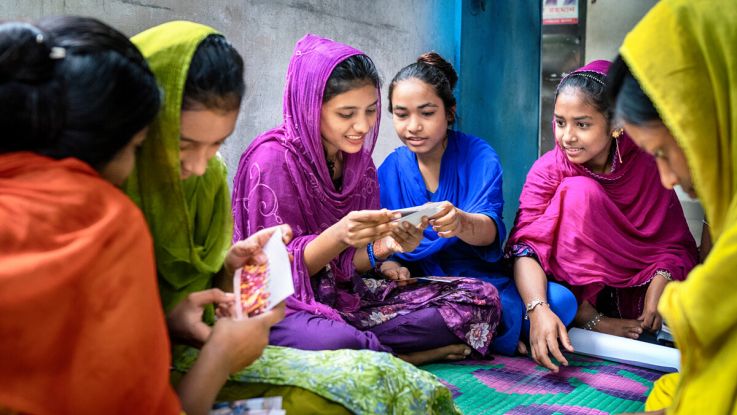Ama's story of child marriage
5 July 2017
Ama was abducted for child marriage on her way home from school when she was 14, in the Upper West region of Ghana. Based on her personal account, we’ve created an animation to tell her story of child marriage. Watch the film and read more below to find out how ActionAid helps girls like Ama be girls, not wives.
Child marriage subjects girls to rape and abuse for the rest of their lives. It is a violation of girls' rights, and denies them their childhood, the chance to go to school and to choose their own life.
Though Ama was only held captive for one day before being released, her experience of being abducted was terrifying. "I was really scared," she says, "and so worried about my future because my mother and my other sisters had got married at an early age and they suffered a lot.”
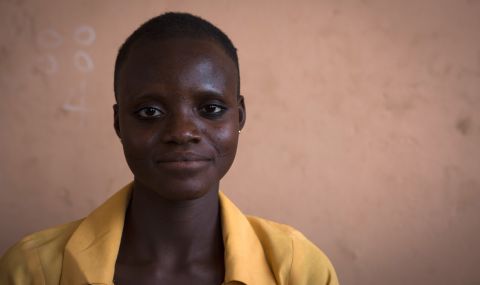
Ama, who was abducted for child marriage when she was 14 .
15 million girls around the world are forced to marry each year. Ama very nearly became one of them, but thanks to the long-term work of ActionAid in her community, her father knew what to do to get his daughter back.
After just one night in captivity, Ama was rescued by her father and local ActionAid worker, Abiba.
How ActionAid's work helped save Ama from child marriage
Abiba co-ordinates 57 COMBAT Squads in the region. COMBAT Squads (Community Based Anti-Violence Teams) talk to communities about girls' rights, report cases of child marriage to the police, physically rescue girls, and bring perpetrators to justice.
Each village has a COMBAT team made up of around ten members who represent a cross section of the community, and are trained by ActionAid and the police.
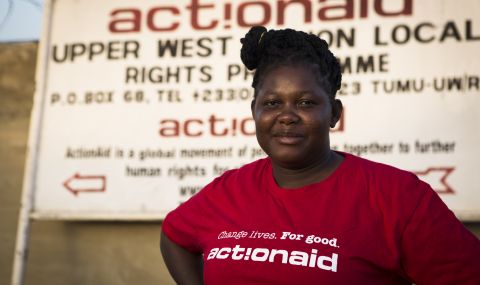
Abiba coordinates 57 COMBAT squads (Community-Based Anti-Violence Teams) working to end child marriage in the Upper West region of Ghana .
In the last five years, Abiba's COMBAT squads have helped return over 160 girls to their families. This is why Abiba's reputation alone was enough to negotiate Ama’s quick release.
Ama explains: “My father said to the men – ‘If you will not release my daughter I will go to ActionAid, who will challenge you.’ I knew then that I would be free."
“The men thought my father was telling lies. But he took his motorbike and went to get Abiba straight away.
As soon as the men saw Abiba they knew that if they did not let me go there would be consequences. So they opened the door and my father scooped me up and brought me home."
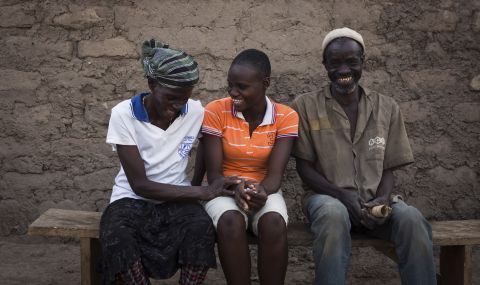
Ama back home with her mum, Fatti, and her dad, Musa .
Ama's child marriage story had a different ending
“I am so thankful to ActionAid for helping me escape," Ama says. "If it was not for my father and ActionAid I wouldn’t have even gone back to school."
When girls’ education is cut short, they lose the chance to learn the skills they need to determine their own future.
Girls who have little or no education are up to six times more likely to be married as children than girls who have secondary schooling.
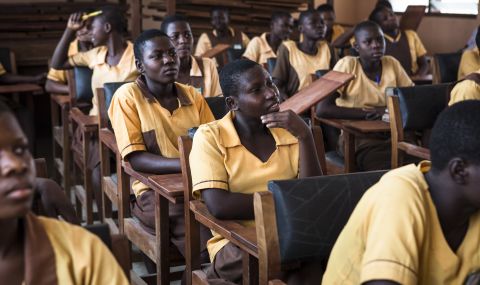
Members of an ActionAid-supported girls' club in their school in northern Ghana .
Having never been to school himself, Ama's father is supportive of her education. Ama says: “He has seen girls who have been educated and where they are now. Some are earning a salary.”
Ama's father was also influenced by plays about the damaging effects of forced marriage put on by the local ActionAid girls’ club. “I know he embraced the message from those plays," Ama says, "and that’s why he rushed to release me."
Rebuilding confidence with girls' clubs
With the help of her school's girls’ club, Ama is rebuilding her confidence. The clubs, supported by ActionAid, are run by teachers like Rashida (below), and help girls to understand and stand up for their rights.
Rashida was abducted aged 13, but managed to escape, finish her education and remarry someone of her own choosing when she was 24.
Everybody calls us ‘ActionAid girls’ and they know not to mess with us!
Women like Rashida act as role models to the girls, showing them what is possible if they finish school.
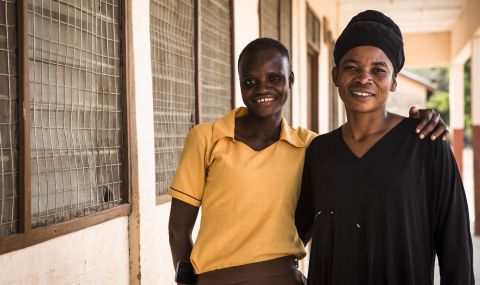
Ama and Rashida, 31, who runs the ActionAid girls’ club in Ama’s school .
Ama says: "I am not afraid of being abducted again because everyone knows that I belong to the ActionAid girl’s club. Everybody calls us ‘ActionAid girls’ and they know not to mess with us!”
Ama believes that the majority of girls in her school are scared to speak out: “I worry about my younger sister. She is more shy than me and could easily be a target for men. I'd like her to be more active in girls’ club the way I am.”
“I have seen a lot of attitudes change”
Inspired by Abiba, Ama wants to be a women's rights worker when she grows up. Abiba has personally helped save more than 50 girls abducted for marriage between 2013 and 2017.
Through formal letters or confronting perpetrators directly, and threatening to involve the authorities, Abiba and her COMBAT teams have successfully secured their release.
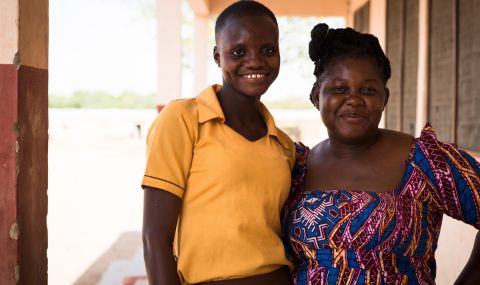
Ama, 14, with ActionAid worker Abiba who helped her escape child marriage .
Abiba's work also focuses on transforming mindsets. “We have met with young girls and boys, Chiefs, opinion leaders, and various community and religious groups,” Abiba explains.
“Once they understand it’s a bad practice, they agree they’ll do certain things to end it. I have seen a lot of attitudes change.”
The most satisfying part of Abiba's job is when people start to take action themselves. “They say, ‘A girl from this area was taken and I was able to work with the parents to bring the child back.’ That really makes me feel so happy.”
Ending child marriage, changing the story
Thanks to the work of women like Abiba, fewer girls are being married off, but as populations grow around the world, hundreds of millions of girls will continue to be at risk.
A monthly donation from you could help us reach more people to change attitudes to child marriage. Please give today to ensure girls like Ama can avoid abduction, remain in school, and can choose their own futures.
